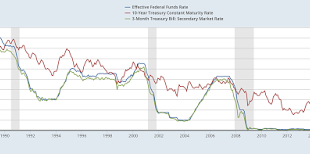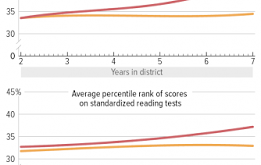[embedded content]
Read More »On the possibility of a recession, again
So the yield curve is really flat, not inverted, but really flat, and that has many (or here) afraid of an impending recession. The fear is basically associated to the inverted yield curve (see below: when the blue line is above the red and green lines, there is an inverted yield curve, with a high short rate and lower longer rates, signaling a recession) which is really flat, and the danger that the Fed will rise the rate in the next meeting in a few weeks. Yield Curve (click to...
Read More »Rental assistance and social hardships
Austerity hurts in many ways. Here is a way in which social spending has profound social effects in the long run. From a recent report from the Center on Budget and Policy Priorities: "Rental assistance sharply reduces homelessness, housing instability, poverty, and other hardships. A growing body of research also finds that rental assistance can improve families’ health, as well as children’s chances of long-term success, particularly if it enables families to live in safe, low-poverty...
Read More »Archives and the history of economic ideas
For the archives, of course As it maybe be painfully clear by now, posts will remain relatively sparse during the rest of the summer break. I recently attended the History of Economics Society (HES) meetings at Duke University, as I noted here. I attended less sessions that I would have liked, but it was enough to confirm the increasing emphasis that has been accorded to archival research. That is, probably, the result that now, slightly more than a 100 years since the...
Read More »The Puerto Rican crisis in one graph
I published a while ago a link to a piece by Argeo Quiñones and Ian Seda on the situation in Puerto Rico. Below a graph of GDP (in constant prices). Clearly the economy started to collapsed in 2007, more or less with the US recession. The difference is that there has been no recovery in Puerto Rico. Not surprisingly there is talk about Prexit (an exit from the US; even though the entry was incomplete and subordinate).
Read More »Exchange rate depreciation and exports: the evidence
In this blog we discussed several times the reasons why exchange rate depreciation is not necessarily a panacea for current account problems (see for example here and here on Argentina depreciation before the last one with the Macri administration, here on the Europe, here in general about the idea of a Sustainable and Stable Competitive Real Exchange Rate or SSCRER, and here on the role of the exit from the Gold Standard during the Depression). Exchange rate skepticism suggested that...
Read More »Trading Up: A Critical Perspective on Jobs, Governance and Security in US Trade Policy
This Tuesday June 28, 2016, the AFL-CIO is holding a conference titled “Trading Up: A Critical Perspective on Jobs, Governance & Security in U.S. Trade Policy,” from 9:00 am to 5:00 pm in Washington, DC. The full program is here. Participants include Joseph Stiglitz, Dean Baker, Tom Palley, Rob Scott, Jeff Faux, among others.You can join online for what should be an lively and insightful debate—especially given recent developments around the Brexit and the Trans-Pacific Partnership...
Read More »Dvoskin and Petri on the relevance of the capital debates
Ariel Dvoskin and Fabio Petri just got their paper published in Metroeconomica. From the abstract: Among the recent interventions in the capital controversy, the debate between Paola Potestio and Kurz & Salvadori has raised important issues. We agree with Potestio's rejection of the legitimacy of a value endowment of capital but we disagree with her dismissal of the relevance of reswitching and reverse capital deepening: these phenomena are very important because they undermine the...
Read More »On the blogs — Brexit edition
Brexit: The Morning After -- by Paul KrugmanBrexit: The Day We Entered the Eye of the Maelstrom -- by Tom PalleyAfter Brexit -- by David RuccioBrexit: Fear, Loathing, and Anger on Both Sides of the Channel -- by Yves SmithBrexit — a rejection of mainstream economics -- by Lars SyllJust how bad will Brexit be, and can it be undone? -- by Simon Wren-LewisThe Day After -- by Jamie Galbraith
Read More »London burning over Brexit at the Rick Smith Show
[embedded content]
Read More » Naked Keynesianism
Naked Keynesianism






